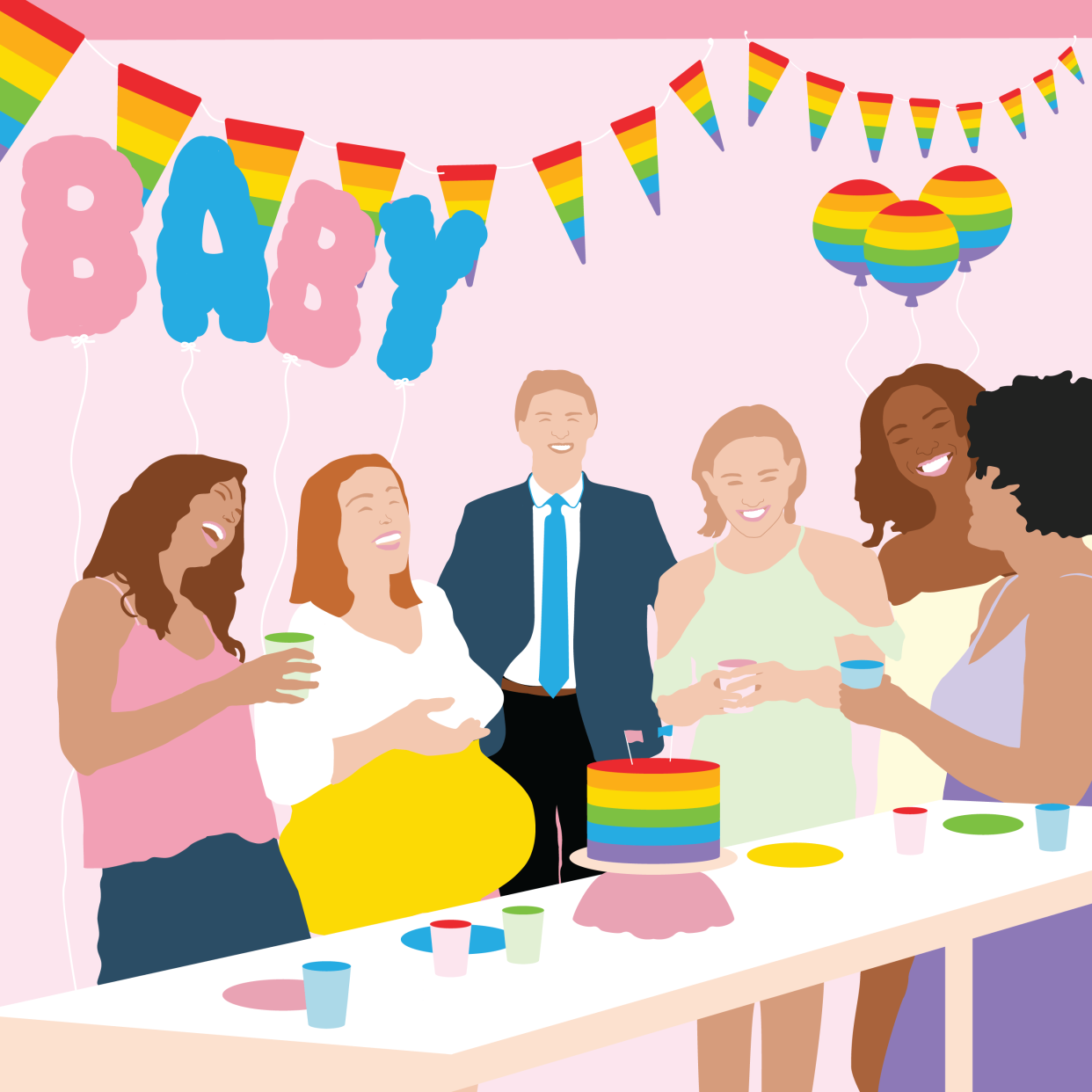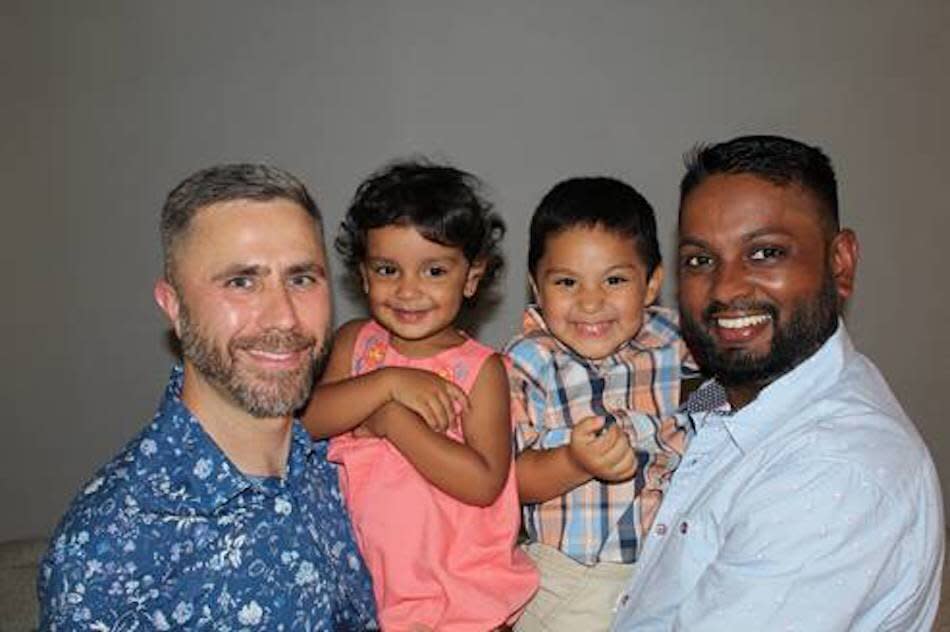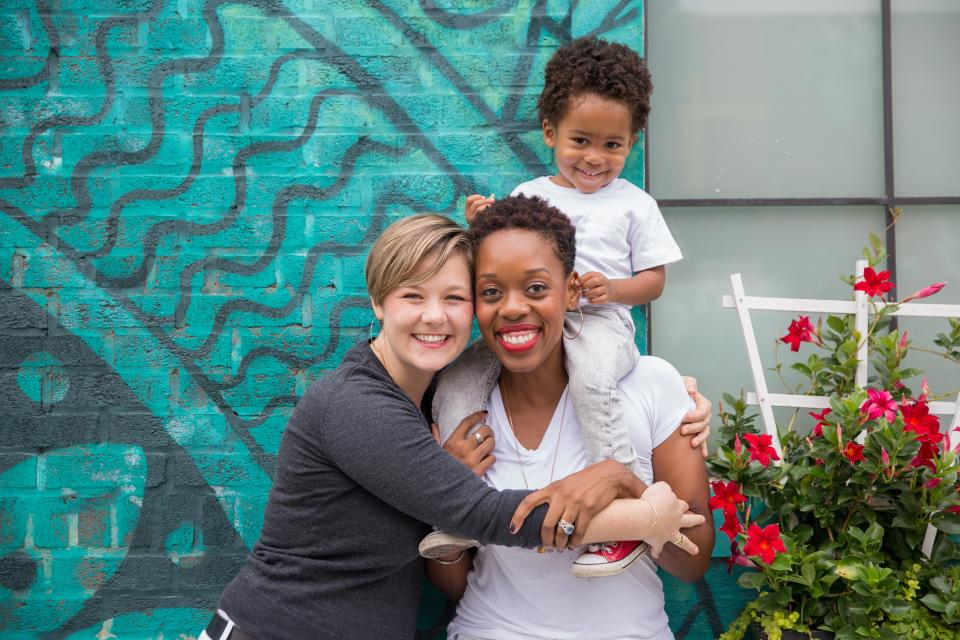The LGBTQ Community's Struggle for Paid Parental Leave is Very Real

Illustration by James Fraley
Seeing his daughter giggle for the first time is something Baal Surujpaul will never forget. It was just one of her many firsts he was able to witness during his several-week paternity leave. "The 20 weeks with my daughter were a great opportunity to spend time with her and get to know her critical milestones," he says. "And I dedicated 100 percent of my time to making sure she was taken care of."
Surujpaul was one of the first American Express employees to use the increased parental leave benefits after the company expanded its policy in 2017, the same year his daughter was born. The company began granting all full- and part-time employees 20 weeks of paid leave whether they welcomed a child through birth, adoption, or surrogacy. There were also additional benefits added for these families, including reimbursements for the cost of adoption or surrogacy.
The latter made all the difference for Surujpaul: He and his partner welcomed their daughter via surrogacy, a costly and intricate process that took them about two years. Not worrying about the financial burden of surrogacy was "like the icing on the cake." The policy was also a breakthrough. "For the LGBTQ community, such a policy is really important," says Surujpaul. "It doesn't matter sex, race, religion—the policy is just for anyone wanting to start a family."

Baal Surujpaul (right) and his family.
The policy is refreshing since not everyone in the LGBTQ community is so lucky. Being the only nation in the developed world without a federal law providing paid leave for new parents, the United States can be a difficult place for anyone planning to welcome children. But it's especially a struggle for those who don't birth a child. "Parental leave was really created for a cisgender heterosexual two-parent dynamic and really benefiting the parent giving birth," says Amanda Hopping-Winn, the chief program officer at Family Equality Council, an organization fighting for equality of LGBTQ families. "The whole system was predicated on kind of one way to have a family."
She knows that all too well. While Hopping-Winn carried her first child, her ex-wife carried their second. As the non-gestational parent, Hopping-Winn wasn't given any paid family leave while working on staff at a university. She wound up using her vacation and sick days, followed by unpaid time off, so she can be there for her newborn. "I wrote a long email to the HR department stating I felt it was discrimination against not only the LGBTQ community, but anyone who adopts or becomes a foster parent, anybody who gets to parenthood without pregnancy," she says.
The Struggles of LGBTQ Parents
The reality is LGBTQ parents are more likely to foster and adopt than non-LGBTQ parents. Statistics show same-sex parents, specifically, are four times more likely to adopt children and six times more likely to foster than straight parents.
And there are other issues that make the lack of guaranteed, paid parental leave a bigger challenge for the LGBTQ community. "They are more likely to be living in poverty," says Ed Harris, chief communications officer at Family Equality Council. A 2016 report on hunger found LGBT adults were 1.6 times more likely not to have enough money for food than other adults.
Reasons for the economic differences include the fact it's not uncommon for the community to have more strayed relationships with their families, says Hopping-Winn, and so they miss out on the financial support many millennials rely on during the transition to adulthood. People of color are also more likely than white people to identify as LGBTQ and it's no secret they already suffer racial wage gaps. In the meantime, families with two mothers suffer gender wage gaps—statistics show lesbian couples are more likely to be poor than gay male couples or heterosexual married couples.
The community, says Harris, also faces employment discrimination. There is no federal law specifically protecting LGBTQ workers. Currently, only 21 states and the District of Columbia ban workplace discrimination based on sexual orientation and 25 percent of LGBT people across the country said they've experienced it firsthand. In turn, some decide to keep their sexual orientation a secret and avoid parental leave discussions entirely. "Asking for parental leave may involve 'outing' LGBTQ identities or relationships at work, even in workplaces that are affirming of LGBTQ employees," adds Harris.
Many end up facing a difficult question when it comes to family building. "Unpaid parental leave is not always an option for our community," says Hopping-Winn. "It often comes down to the decision if they afford as a family unit to take unpaid time when a new child enters the home."
Positive Changes Are Happening
The good news is, things are getting better. Like American Express, more and more companies are expanding their parental leave policies to be more inclusive. In 2017, IBM, for example, started giving fathers, partners, and adoptive parents 12 paid weeks off, along with reimbursements for adoption and surrogacy. Microsoft, which offers three months paid leave for fathers, adoptive parents, and foster parents, said in 2018 its taking it a step further by partnering only with vendors and suppliers (with more than 50 employees) who offer at least 12 weeks paid parental leave for birth or adoptive parents.
Reasons for these changes? "That shift is happening in greater conversations as women enter leadership more and more diverse perspectives are making decisions at the top," says Shijuade Kadree, chief advocacy officer of the LGBT Community Center, a New York City-based hub offering advocacy, health, and wellness programs for the LGBT community. There are also more fathers saying they want to stay home with their kids—17 percent of all stay-at-home parents in 2016 were dads, an increase from 10 percent in 1989, according to the Pew Research Center.

Shijuade Kadree and her family. PHOTO: Andrea Scrivanich
"You're also seeing businesses and nonprofit sector employers more willing to ask, 'What can we do to change this conversation?' And I think that's why you start seeing people saying parental leave instead of maternity and paternity leave," adds Kadree, whose own employer increased its policy from the 10 paid days off she was given when she was pregnant four years ago to now offering 12 weeks paid benefits.
And a growing number of Americans are becoming accepting of the LGBTQ community—a Pew Study found 63 percent say "homosexuality should be accepted by society"—allowing for more positive conversations to start happening about LGBTQ parenting. Bottom line, says Kadree, "Queer parenting is just parenting."
Anna Halkidis is the features editor at Parents.com. Keep up with her on Twitter and Instagram.

